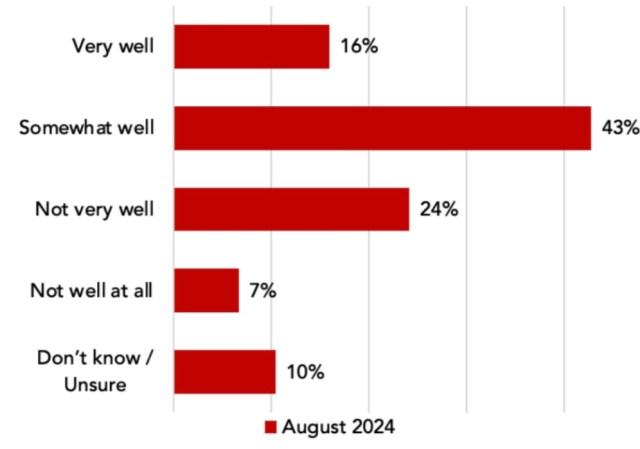Sacred Heart University’s Institute for Sustainability & Social Justice (ISSJ) partnered with GreatBlue Research to produce a poll titled “United States Youth on Sustainability, Social Justice, Climate Change and the Role of Higher Education.”
This poll gathered over 2,000 responses nationally from youth aged 15-29 between July 29 and Aug. 5. The results reveal details about the percentage of “eco-anxiety” experienced in the U.S.

Poll results for how well students think colleges are preparing them to handle climate change issues in their lives.
Institute for Sustainability & Social Justice, Sacred Heart University

Poll results for how important students think it is for colleges to teach about sustainability and social justice issues.
Institute for Sustainability & Social Justice, Sacred Heart University
The results showed that over half of the U.S. youth population polled are suffering from “eco-anxiety,” which refers to the “psychological distress” impacting day-to-day life that is caused by one’s concern for climate change.
Michael Vigeant, CEO of Greatblue Research, received a Bachelor of Science in communications from SHU, according to the GreatBlue website. SHU also awarded Vigeant with the College of Arts & Sciences Alumni Leadership Award in September 2016.
According to the university website, the ISSJ originated as a section of the Laudato Si’ Initiative, which SHU created in 2022.
Inspired by Pope Francis, the Laudato Si’ Initiative “commits to nurturing an ‘ecological conversation’ among all community members.”
According to the survey, 90% of the participants responded that they believe climate change is currently taking place. 61% of those interviewees believe that climate change is caused by human activity while 29% cited natural environmental changes as the reason.
“In the 1980s, we hadn’t started to see these repeated visible impacts of the rapidly changing climate at that point. So I think people were complacent in those days and are still somewhat complacent. However, that is beginning to change,” said Dr. Kirk Bartholomew, ISSJ Development Director.
The survey split the U.S. into four regions: northeast, midwest, south and west. Results of questions related to eco-anxiety levels, individual responsibility to climate change and steps people would be willing to take in their own lives related to climate change showed similar results amongst the four regions.
“I thought there would be a difference [in results amongst regions],” said Brooke Suter, a specialist who worked alongside Bartholomew on this survey.
In regards to motivation to act on climate change, 44% of survey participants said that concern for their future motivates them to act, 43% cited personal beliefs, 41% cited a desire to protect the environment and 29% cited information from media and the news.
“I’m worried about a lot of things, but to what degree is this concern actually impacting your life? Not just a worry, but psychological distress,” said Suter.
According to the responses, the largest barrier that prevents people from fighting climate change is the lack of financial resources, which was answered by 39% of respondents.
14% of respondents indicated that they believe that climate change, sustainability and social justice are not issues in the U.S. and their respective communities.
Sophomore Emily Donoghue said that she isn’t sure what SHU needs to do to address climate change.
“I believe climate change is a real issue. I just don’t know what we can do as a university. I hope the ISSJ can continue to help educate and support us in these matters,” said Donoghue.
Results of the survey indicate that 57% of respondents believe that sustainability and social justice are relevant in the choices they make in their personal lives, 51% believe that they are relevant in their future employment, 34% believe that they are relevant in clubs/organizations and 27% believe that they are relevant in schoolwork.
7% of respondents believe that sustainability/social justice have no relevance in any area of their lives.
“This is the most challenging issue of our time. It impacts everything,” Bartholomew said.
Samantha Madigan contributed to this article.



